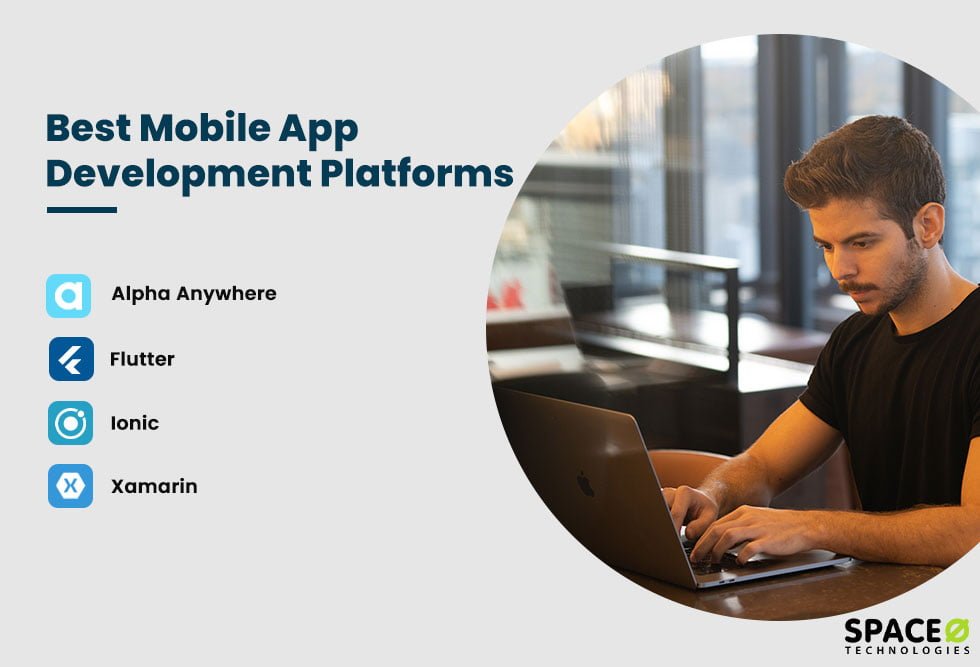The mobile application development platform market is expected to generate USD 70.59 billion by 2030. Inevitably, the demand for app development platforms is increasing because it allows developers and entrepreneurs to assemble various elements and features into an app.
However, we know selecting the best mobile application development platform would not be easy for you. Therefore, to make it easy, we have compared the best mobile app development platforms and shared essential criteria to select one of the best platforms.
Table of Contents
What is a Mobile Application Development Platform?
A mobile application development platform (MADP) is a suite of tools, services, and technologies. It allows anyone to assemble various features and elements. Also, allows to design, develop, test, deploy, and maintain mobile applications across multiple platforms, devices, and networks.
Everyone would agree that proper mobile application development is not an easy task to do. You have to take a lot of things into consideration, such as compatibility with all the devices and mobile platforms.
It is challenging to develop multiple single apps to achieve compatibility with all the platforms and devices.
But using a MADP, you will only have to maintain 1 codebase to enable compatibility with the other platforms, devices, and networks.
Hence, it will streamline the mobile app development process at a low-cost price.
Ready to Turn Your App Idea into Reality?
Want to validate your app idea? Want to get a free consultation from an expert?

Best App Development Platforms
Alpha Anywhere
It is a complete front & back-end and a low-code application development platform. It is widely used for the rapid development, distribution & deployment of mobile applications on both iOS and Android platforms.
It has unique coding-optional technology, which allows developers to achieve high productivity with complete freedom.
Features
- Easy to connect with all SQL and no-SQL databases
- Flexible conflict resolution and large data storage capacity
- Enterprise-class data protection and complete administrative control
- Tightly integrated analytics & charting features
- Easily add drag-and-drop editor and scheduling to cross-platform apps
Want to try and download Alpha Anywhere?
Flutter
Flutter is the best UI toolkit that helps to build native applications for the web, mobile, and desktop. It comes with fully customized widgets, which help to create native mobile applications in a very short time. Its layered architecture will ensure the fast rendering of components. Here are the top applications developed using Flutter.

Features
- Built-in Cupertino (iOS-flavor) widgets
- Supports both iOS and Android platforms
- Can develop high-performance apps
- Rich motion APIs
Want to try and download Flutter?
Mendix
Mendix is the fastest & easiest low-code app development platform. Therefore, it is widely used by businesses to develop mobile & web apps for high performance.
It accelerates the delivery of enterprise applications, from ideation to deployment and operations. It becomes easy to implement both Agile and DevOps with Mendix.
Moreover, it also offers both no-code and low-code tooling in one single fully integrated platform.
Features
- The rapid building, deploying, and operating of enterprise-grade applications
- Can be used for low-code and no-code platforms
- Build on unrivaled cloud architecture
Xamarin
Xamarin supplies add-ins to Microsoft Visual Studio that allows developers to develop Android, iOS, and Windows Apps with C# codebase. The reason behind the preference of using Xamarin is that it allows code sharing in multiple platforms, such as cross-platform mobile app development.
Being a cross-platform and open source app building platform, Xamarin is known for offering a development ecosystem with back-end, API, and components. Here are the top applications developed using Xamarin.

It is also supported by various tools, libraries, and programming languages. Moreover, it also has a cloud service, which allows testing on any number of devices.
Features
- Produce only fewer bugs and faster time
- Best backend infrastructure
- Component store with UI controls, cross-platform libraries, and third-party libraries
- Allows application Indexing and Deep Linking
Want to try and download Xamarin?
Unity Ads
Unity Ads is an important platform when it comes to integrating video ads into mobile games to increase player engagement. You must have seen the recommendations of seeing a video to get one more life to play the game.
Unity Ads is also known for offering the highest Average Revenue Per User (ARPU) of any global rewarded video ad network. Here are the top applications developed using Unity.

Features
- The setup is simple and easy to implement
- Helps to engage more players
- Offers a positive player experience
- Doesn’t interrupt the gameplay while introducing rewarded gameplay
Want to try and download Unity Ads?
Ionic
Ionic comes into the picture when you want to build an interactive hybrid mobile and progressive web apps along with cross-platform applications.
The unique benefit of using this open-source framework is that you can create applications and ship them to deployable locations every time you build.
If you want an easy visual development environment, then you can install Ionic Studio, which is the lightning and powerful version of Ionic. This mobile app development software is widely known as a tool for developing hybrid mobile apps as it is an HTML 5 mobile app development framework. Here are the top apps developed using Ionic.

Features
- Ionic is a free and open-source project
- Fast and powerful development platform
- Have complete control over app building
- Can build native and progressive web applications
- Easily handles all the UI components
- A developer can build an app for all app stores with a single code base
Want to try and download Ionic?
React Native
It is a widely used JavaScript library to create native mobile apps for all devices and platforms. It helps to develop rich apps to give the best user experience.
Moreover, this mobile app development software also allows a developer to create platform-specific versions of various components for native apps with easy use of a single codebase across various multiple platforms. Here are the top applications developed using this platform.

Features
- Low-code requirement
- Compatible with third-party plugins
- Declarative API for predictive UI
- Supports both iOS and Android
Want to try and download React Native?
Sencha
Sencha Ext JS is an MVC-based JavaScript platform, offering a high level of responsiveness to the application for improving customer satisfaction.
Sencha has merged with Ext JS, and now you can use this for building data-intensive applications for both web and mobile. It is also known for cross-platform mobile development. Here are the top applications developed using Sencha.

Features
- Has the ability to manage millions of data
- Flexible layout system and data representation
- Code can be translated with the help of the mobile app development tool
- Rationalized configuration system
- Best support with the animations and touch events
Want to try and download Sencha?
Adobe PhoneGap
Adobe and Apache both have sponsored Adobe PhoneGap. This platform is widely known for its use in Android development.
The benefit of using PhoneGap is that you can develop a single app that can work on all mobile devices. Moreover, it is an open-source desktop application, and you can link the apps to mobile devices.
Features
- Compatible on all the platforms
- Works effectively on JavaScript, HTML5,and CSS3
- Easy to integrate various libraries to enhance app development
- Can extend the functionality of the app with a plug-in architecture
- Strong backend and easy to develop an app
Want to try and download Adobe PhoneGap?
NativeScript
NativeScript is one of the preferable platforms to create native mobile applications. This helps to reduce the code and load time of native apps on the system.
Moreover, there are many leading companies, such as Puma and SAP, love using Native Scripts for their web empowerment platform.
Features
- Native user interface without WebViews
- Full direct access to Android and iOS APIs
- Cross-platform mobile app
- Good backend support
- Hundreds of NativeScript plugins are available
- Provides three complete real-world app implementations
Want to try and download NativeScript?
Swiftic
Swiftic is one of the best platforms for iOS app development services. It offers an easy-to-navigate interface for everyone to build an app. Swiftic offers a lot of profitable app features, such as unlimited push notifications, advanced analytics, and also makes the app attractive to look at.
Swiftic, an iPhone mobile app development software also offers a 30-day money-back guarantee. Along with that, it has a 6-months of success guarantee scheme. So, if you do not get the result within 6 months, then the service will be free for you.
Moreover, Swiftic has seven different templates and UX/navigation styles and comes in different colors, background pictures, and building blocks.
Features
- Helps to publish app on the App Store
- Easy to create a customized app with loyalty programs
- Attract customers with eye-catching push notifications
- Implement features to contact via call or email
- Guarantee app brings results for the business users
- Third-party integration
Want to try and download Swiftic?
Best functionalities and exceptional customer support
Want to try and download Mendix?
After checking out the best app development platforms, we will compare the listed platforms based on their prices, supported programming languages, ratings, and cross-platform deployment support. We have prepared this table with the help of G2 that is the top review website. So, let’s get started:
Mobile Application Development Platforms Comparison
As per the above comparison, we can say that both Alpha Anywhere and Flutter are the best platforms, considering their features, ratings, and overall support.
Top 8 Criteria to Select a Mobile App Development Platform
Now, you know almost all the information about these 11 best platforms for app development, so you shouldn’t miss its most valuable features to select the best one.
Here are the most valuable features and criteria to select the right platform that makes your work easier.

Multi-platform Support
Whenever you plan to develop enterprise apps or consumer apps with the MADP, ensure you look for this feature.
In an era where the mobile ecosystem is evolving with several platforms, devices, and other factors, it is essential to opt for a MADP that supports multi-platforms.
Your decision would be investing in a cross-platform mobile application development platform that helps you with integrating and modifying various features across all the devices and OS platforms, such as the Web, Android, and iOS.
Best Security
We expect our mobile apps to run seamlessly without any significant glitch.
However, the mobile app often contains several sensitive information, such as payment details and a contact list.
Losing a mobile device can haunt anyone. Therefore, it will require an additional layer of security. A MADP must provide secure management of user data and information.
In such cases, you must ensure to prevent data using a reliable mobile development app platform.
Availability of Integration
It is often observed that many clients integrate new and improved features in the next stage of app development.
So, if you have the probability of integrating new features into your app once it is developed, then choose a platform that can match your requirements and help you to integrate the features later.
Open Source Libraries Access
The fact is that the app developer community is highly dependent on open source libraries and APIs, and there is no denying that it plays an essential role in increasing the speed, integration, and delivery of the app development process.
Therefore, make sure you choose a platform that gives complete freedom and easy access and integration with such libraries.
App Monitoring and Analytics
Most enterprise apps try to offer a rich user experience and choose agile ways of development. In most cases, user feedback triggers the best use of the app.
This allows app developers to accommodate necessary changes in a swift manner. And where MADPs play an essential role.
It helps to convert the user data into visual insights. Therefore, a good MADP provides easy monitoring of app performance and analytics.
Mobile App Development Tools
The benefit of mobile app development tools is that they provide a collaboration platform for developing, testing, debugging, deploying, hosting, and maintaining mobile apps more effortlessly.
If you want to build your app for Play Store, then choose Android Studio, an app development tool. Otherwise, you can select Xcode for the App Store.
Many hosts prefer a low code app development for their project with pre-designed templates and drag-and-drop app builders support.
Because of its promising nature, many developers prefer a CLI, which provides high agility for setting up and managing the development environment.
Choose a platform that will be comfortable for the developer because restrictions with CLI can be frustrating and may hamper time.
Deployment
The benefit of using a MADP is that you can deploy it on-premise and available as a cloud-based service. You can easily start without any significant upfront costs with cloud services.
However, an on-premise subscription will give you higher levels of security at a lower cost if you are in the long run.
Make sure you choose the right way and invest in a MADP that can fulfill the requirements of your developers.
Future-proof Functionality
There is no doubt that technology has advanced over the years. Everyone expects more with each advanced version.
If you have also planned to integrate any features into an app after creating a minimal viable product (MVP), then you must focus on this feature.
And this is the reason you must opt for a platform that can evolve over the years with the changing technological requirements.
Turn Your App Idea Into Reality Today
Explore top mobile app development platforms and let us help you build a custom app tailored to your needs. Get started with our expert services now!
Frequently Asked Questions
Which app development platform is the best for Android?
- Xamarin
- PhoneGap
- Sencha
- Ionic
Which app development platform is the best for iOS?
- Alpha Anywhere
- Mendix
- Swiftic
Which app development platform is best for cross-platform?
- Xamarin
- React Native
- Flutter
- Ionic
How many apps can be built with an app builder platform?
Usually, there is no limit on creating mobile apps. You can create many mobile apps using an application builder.
What are the different types of MADPs?
There are many types of MADPs. The more common ones are Operating Systems, Computing Platforms, Database Platforms, Storage Platforms, Application Platforms, Mobile Platforms, Web Platforms, and Content Management Systems.
Conclusion
Now, you know what a MADP is, how it functions, and also its comparisons, it must be easy for you to select the best mobile application development platform for your project.
In case, if you have any confusion regarding the best mobile development platform, app development software, refer to our blog post. We, being one of the leading app development companies, have years of experience in developing apps using different platforms for app development.
Our IT team and app development team have hands-on experience in developing iOS and Android apps. No matter how challenging your app idea is, we will help you to find the best solution.




















